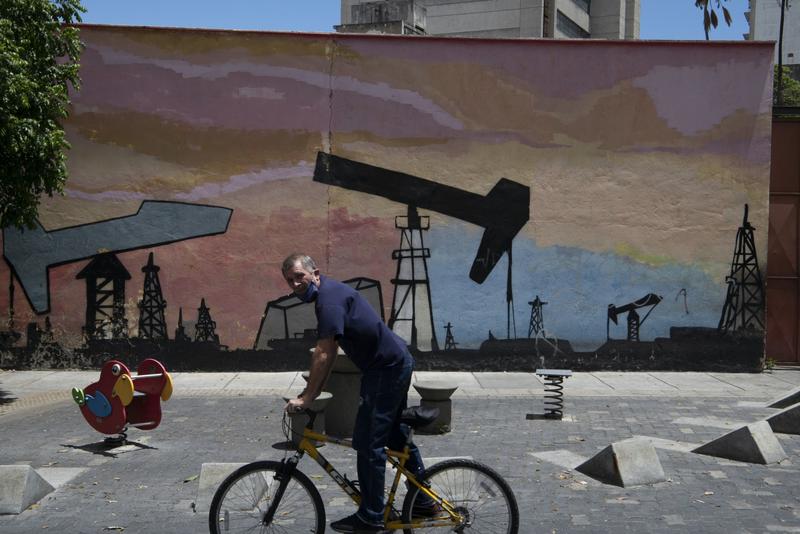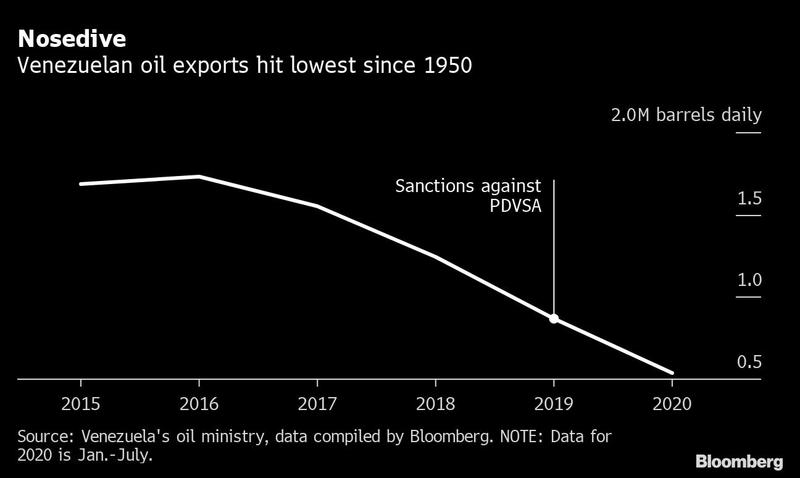 A cyclist rides past a mural of oil pump jacks on the Boulevard de Sabana Grande in Caracas, Venezuela, on July 12, 2020. (PHOTO / BLOOMBERG)
A cyclist rides past a mural of oil pump jacks on the Boulevard de Sabana Grande in Caracas, Venezuela, on July 12, 2020. (PHOTO / BLOOMBERG)
The Trump administration is considering additional sanctions on Venezuela aimed at halting the remaining fuel transactions permitted with the South American nation, according to people familiar with the matter.
The measures could target crude swaps with companies in Asia and Europe, said the people, who requested anonymity because the talks are private. US officials have debated the move for months, yet they initially prioritized actions against Iran, which began exporting gasoline to fuel-starved Venezuela. The sanctions haven’t been decided and talks are ongoing, the people said.
Last week, the US seized the contents of four Iranian tankers carrying more than 1.1 million barrels of gasoline to the country. Venezuela is unable to produce its own gasoline and other products refined from crude because of widespread mechanical failures at refineries. While the imported fuel is critical for farmers and truckers that move food across the country, opposition lawmakers have argued the deals prop up the regime led by Nicolas Maduro.
Shunned by US refiners, Venezuela’s oil exports have fallen to about 535,000 barrels a day this year, the lowest since 1950, according to data compiled by Bloomberg
ALSO READ: Venezuela's major opposition parties pledge to boycott Dec election
A spokesman at the Treasury Department declined to comment. Representatives at the White House and State Department as well as Venezuela’s Finance Ministry, Oil Ministry and state-run Petroleos de Venezuela didn’t respond to requests for comment.
Shunned by US refiners, Venezuela’s oil exports have fallen to about 535,000 barrels a day this year, the lowest since 1950, according to data compiled by Bloomberg. In August, diesel swaps accounted for almost 80 percent of the crude scheduled to be shipped overseas, the data show. Firms including India’s Reliance Industries, Repsol SA of Spain and Italy’s Eni SpA have loaded oil in exchange for supplying diesel to Caracas.

READ MORE: Iran denies seizure of Venezuela-bound oil tankers by US
The Treasury Department has so far apparently exempted oil swaps when they’re in exchange for fuel or food, granting flexibility to some larger companies that have kept the administration abreast of their Venezuelan business activities.
The transactions have come into focus again as President Donald Trump makes a final push against Maduro ahead of the US election. During his State of the Union speech in February, the president promised to break the socialist’s “grip of tyranny” as opposition leader Juan Guaido watched in the gallery.


